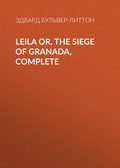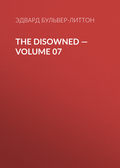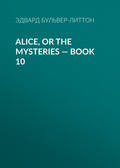
Эдвард Бульвер-Литтон
The Caxtons: A Family Picture — Volume 13
"Stand back!" said he, panting, and taking aim with his gun: "it is loaded."
"Yes," said I; "but though you're a brave poacher, you dare not fire at your fellow-man. Give up the gun this instant."
My address took him by surprise; he did not fire. I struck up the barrel, and closed on him. We grappled pretty tightly, and in the wrestle the gun went off. The man loosened his hold. "Lord ha' mercy! I have not hurt you?" he said falteringly.
"My good fellow,—no," said I; "and now let us throw aside gun and bludgeon, and fight it out like Englishmen, or else let us sit down and talk it over like friends."
The Will o' the Wisp scratched its head and laughed.
"Well, you're a queer one!" quoth it. And the poacher dropped the gun and sat down.
We did talk it over, and I obtained Peterson's promise to respect the preserve henceforth; and we thereon grew so cordial that he walked home with me, and even presented me, shyly and apologetically, with the five pheasants he had shot. From that time I sought him out. He was a young fellow not four and twenty, who had taken to poaching from the wild sport of the thing, and from some confused notions that he had a license from Nature to poach. I soon found out that he was meant for better things than to spend six months of the twelve in prison, and finish his life on the gallows after killing a gamekeeper. That seemed to me his most probable destiny in the Old World, so I talked him into a burning desire for the New one; and a most valuable aid in the Bush he proved too.
My third selection was in a personage who could bring little physical strength to help us, but who had more mind (though with a wrong twist in it) than both the others put together.
A worthy couple in the village had a son, who, being slight and puny, compared to the Cumberland breed, was shouldered out of the market of agricultural labor, and went off, yet a boy, to a manufacturing town. Now about the age of thirty, this mechanic, disabled for his work by a long illness, came home to recover; and in a short time we heard of nothing but the pestilential doctrines with which he was either shocking or infecting our primitive villagers. According to report, Corcyra itself never engendered a democrat more awful. The poor man was really very ill, and his parents very poor; but his unfortunate doctrines dried up all the streams of charity that usually flowed through our kindly hamlet. The clergyman (an excellent man, but of the old school) walked by the house as if it were tabooed. The apothecary said, "Miles Square ought to have wine;" but he did not send him any. The farmers held his name in execration, for he had incited all their laborers to strike for another shilling a week. And but for the old Tower, Miles Square would soon have found his way to the only republic in which he could obtain that democratic fraternization for which he sighed; the grave being, I suspect, the sole commonwealth which attains that dead flat of social equality that life in its every principle so heartily abhors.
My uncle went to see Miles Square, and came back the color of purple. Miles Square had preached him a long sermon on the unholiness of war. "Even in defence of your king and country!" had roared the Captain; and Miles Square had replied with a remark upon kings in general that the Captain could not have repeated without expecting to see the old Tower fall about his ears, and with an observation about the country in particular, to the effect that "the country would be much better off if it were conquered!" On hearing the report of these loyal and patriotic replies, my father said "Papoe!" and roused out of his usual philosophical indifference, went himself to visit Miles Square. My father returned as pale as my uncle had been purple. "And to think," said he mournfully, "that in the town whence this man comes there are, he tells me, ten thousand other of God's creatures who speed the work of civilization while execrating its laws!"
But neither father nor uncle made any opposition when, with a basket laden with wine and arrowroot, and a neat little Bible bound in brown, my mother took her way to the excommunicated cottage. Her visit was as signal a failure as those that preceded it. Miles Square refused the basket,—"he was not going to accept alms and eat the bread of charity;" and on my mother meekly suggesting that "if Mr. Miles Square would condescend to look into the Bible, he would see that even charity was no sin in giver or recipient," Mr. Miles Square had undertaken to prove "that, according to the Bible, he had as much a right to my mother's property as she had; that all things should be in common; and when all things were in common, what became of charity? No, he could not eat my uncle's arrowroot and drink his wine while my uncle was improperly withholding from him and his fellow-creatures so many unprofitable acres: the land belonged to the people." It was now the turn of Pisistratus to go. He went once, and he went often. Miles Square and Pisistratus wrangled and argued, argued and wrangled, and ended by taking a fancy to each other; for this poor Miles Square was not half so bad as his doctrines. His errors arose from intense sympathy with the sufferings he had witnessed amidst the misery which accompanies the reign of millocratism, and from the vague aspirations of a half-taught, impassioned, earnest nature. By degrees I persuaded him to drink the wine and eat the arrowroot en attendant that millennium which was to restore the land to the people. And then my mother came again and softened his heart, and for the first time in his life let into its cold crotchets the warm light of human gratitude. I lent him some books, amongst others a few volumes on Australia. A passage in one of the latter, in which it was said "that an intelligent mechanic usually made his way in the colony, even as a shepherd, better than a dull agricultural laborer," caught hold of his fancy and seduced his aspirations into a healthful direction. Finally, as he recovered, he entreated me to let him accompany me. And as I may not have to return to Miles Square, I think it right here to state that he did go with me to Australia, and did succeed, first as a shepherd, next as a superintendent, and finally, on saving money, as a landowner; and that in spite of his opinions of the unholiness of war, he was no sooner in possession of a comfortable log homestead than he defended it with uncommon gallantry against an attack of the aborigines, whose right to the soil was, to say the least of it, as good as his claim to my uncle's acres; that he commemorated his subsequent acquisition of a fresh allotment, with the stock on it, by a little pamphlet, published at Sydney, on the "Sanctity of the Rights of Property;" and that when I left the colony, having been much pestered by two refractory "helps" that he had added to his establishment, he had just distinguished himself by a very anti-levelling lecture upon the duties of servants to their employers. What would the Old World have done for this man?







